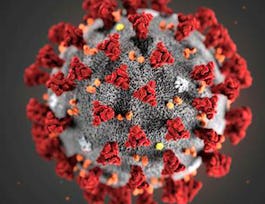This course was developed by the Karolinska Institutet (KI) and the Federation of the European Academies of Medicine (FEAM) as part of the research project 'Pan-European Response to the Impacts of the COVID-19 and future Pandemics and Epidemics' (PERISCOPE). Funded by the European Commission Research Funding programme Horizon 2020 under the Grant Agreement number 101016233, PERISCOPE investigates the broad socio-economic and behavioural impacts of the COVID-19 pandemic, to make Europe more resilient and prepared for future large-scale risks.



One Health: Pandemic preparedness, prevention, and response

Instructeur : Marco Brambilla
1 665 déjà inscrits
Inclus avec 
(20 avis)
Détails à connaître

Ajouter à votre profil LinkedIn
17 devoirs
Découvrez comment les employés des entreprises prestigieuses maîtrisent des compétences recherchées


Obtenez un certificat professionnel
Ajoutez cette qualification à votre profil LinkedIn ou à votre CV
Partagez-le sur les réseaux sociaux et dans votre évaluation de performance

Il y a 7 modules dans ce cours
The intro module consists of two lessons, where the first lesson aims to give a short description of the history and journey of One Health as a framework and the notion of human-animal-environmental health interconnection that it is built upon. The second lesson is an introduction to "creeping crisis", a concept to explain crisis that evolve over time and demands new toolboxes to tackle. After completing the module, participants should have an overview of One Health’s history as well as a deeper understanding of One Health, and the importance in exploring and understanding actual and forthcoming issues that can be found at the human-animal-environmental interface and manifest a creeping crisis.
Inclus
2 vidéos4 lectures2 devoirs
The second module consists of four lessons where the general aim is to explore One Health’s current status and identify ways of moving forward to strengthen the concept’s impact on pandemic preparedness and prevention. This by highlighting the gaps, obstacles, and imbalances that exist within the framework, especially regarding the three sectors of human, animal, and environmental health. The first and second lessons present One Health from a legal perspective and explains how the legal system could be more aligned to One Health in order to safeguard human, animal and environmental health. The third lecture continues where the two previous lessons took off and further explores anthropocentrism and a particular blind spot within One Health: human-animal relations, whereas lesson four focuses on the relation between the health of nature and One Health in the context of pandemic risk and mitigation.
Inclus
4 vidéos6 lectures4 devoirs
In the previous modules, you learned more about the struggle to define "One Health". Due to the complexity of the concept, a correct conceptualization of One Health can enhance its implementation. But how can we translate theory to practice? Policymakers need evidence to inform policy, and scientists play a key role in the process. In this module, you will access resources that reverberate the literature debate around the science-policy nexus. Finally, the module is preparatory for the following ones, which will bring to your attention some case studies where the One Health approach was put into practice and implemented. For this purpose, in this module, you will read more about the operationalization of One Health.
Inclus
2 lectures
As your familiarity with the conceptualization of One Health and the process to operationalize it has grown, the fourth and the fifth module will provide you with some case studies. Lecturers will discuss successes and challenges in implementing One Health, especially in the COVID-19 pandemic context. This module will zoom into each of the pillars of One Health: human health and food safety, animal health, and environmental health.
Inclus
4 vidéos8 lectures4 devoirs
Now that you have deepened your knowledge of each pillar of the One Health approach, you will embrace the concept in its oneness and interdisciplinarity. The fifth module groups case studies that are relevant to topics transversal to human, animal, and environmental health. Particularly, you will learn more about best practices and challenges in implementing One Health when addressing zoonoses, Anti Microbial Resistance (AMR), and climate change.
Inclus
3 vidéos8 lectures3 devoirs
In the previous module, you realised how challenging the implementation of One Health could be thanks to the case studies provided by lecturers. This module will offer you an overview of the existing coordination and governance mechanisms to enhance the One Health implementation at the global and regional levels. Some institutions are already a solid reality, others were recently created or are still discussed. This module will nudge you to reflect on the future of Global Health Governance and One Health.
Inclus
4 vidéos6 lectures4 devoirs
In this final module, you will hear from the MOOC's organisers: Walter Osika, Senior Specialist at KI; Elin Pöllänen, Research assistant at KI; Emma Martinez Sanchez, Senior Scientific Policy Officer at FEAM; and, Claudia Granaldi, Junior Policy Officer at FEAM. The coordinators of the course will discuss the main take-home messages that emerged from each module and express their views concerning the potential development of 'One Health'. Do not miss the final discussion 'One Health & you'!
Inclus
1 vidéo1 lecture1 sujet de discussion
Instructeur

Offert par
Recommandé si vous êtes intéressé(e) par Public Health

Imperial College London

Imperial College London

Imperial College London
Pour quelles raisons les étudiants sur Coursera nous choisissent-ils pour leur carrière ?




Avis des étudiants
20 avis
- 5 stars
60 %
- 4 stars
25 %
- 3 stars
15 %
- 2 stars
0 %
- 1 star
0 %
Affichage de 3 sur 20
Révisé le 1 mai 2023
Great learning during the course ,

Ouvrez de nouvelles portes avec Coursera Plus
Accès illimité à 10,000+ cours de niveau international, projets pratiques et programmes de certification prêts à l'emploi - tous inclus dans votre abonnement.
Faites progresser votre carrière avec un diplôme en ligne
Obtenez un diplôme auprès d’universités de renommée mondiale - 100 % en ligne
Rejoignez plus de 3 400 entreprises mondiales qui ont choisi Coursera pour les affaires
Améliorez les compétences de vos employés pour exceller dans l’économie numérique
Foire Aux Questions
Access to lectures and assignments depends on your type of enrollment. If you take a course in audit mode, you will be able to see most course materials for free. To access graded assignments and to earn a Certificate, you will need to purchase the Certificate experience, during or after your audit. If you don't see the audit option:
The course may not offer an audit option. You can try a Free Trial instead, or apply for Financial Aid.
The course may offer 'Full Course, No Certificate' instead. This option lets you see all course materials, submit required assessments, and get a final grade. This also means that you will not be able to purchase a Certificate experience.
When you purchase a Certificate you get access to all course materials, including graded assignments. Upon completing the course, your electronic Certificate will be added to your Accomplishments page - from there, you can print your Certificate or add it to your LinkedIn profile. If you only want to read and view the course content, you can audit the course for free.
You will be eligible for a full refund until two weeks after your payment date, or (for courses that have just launched) until two weeks after the first session of the course begins, whichever is later. You cannot receive a refund once you’ve earned a Course Certificate, even if you complete the course within the two-week refund period. See our full refund policy.

